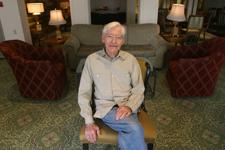Vancouver poet Robin Blaser died of a brain tumour in Vancouver on May 7, 2009, just short of his 84th birthday.
Long known as one of North America’s most essential and influential poets, Blaser was born in Denver, Colorado, raised in Idaho, and arrived in Berkeley, California in 1944.
His early life was marked by his association with two of America’s finest poets. At Berkeley, he met fellow young poets Jack Spicer and Robert Duncan (in part through the anarcho-passivist movement). They became a loose trio of gay men and wrote much of the poetry at the centre of the San Francisco Renaissance of the 1950s and ’60s.
In 1966, Blaser moved to Vancouver, where he spent two decades as a distingished professor at Simon Fraser University, before retiring to professor emeritus in 1986. The last surviving member of the original trio, Blaser became mentor, friend and beloved teacher to multiple generations of writers, existing as an example of how far language could move outside the borders of structural and intellectual form, influencing a huge group of Canadian and American writers such as George Bowering, Stan Persky, Daphne Marlatt, John Ashbery, Robert Creeley, Michael Ondaatje, Steve McCaffery, Erin Mouré, BP Nichol, Sharon Thesen, Phyllis Webb and Fanny Howe.
After his retirement, Blaser was invited to lecture at the Jack Kerouac School of Disembodied Poetics. He did, in 1992, but when asked to return the following year, he declined. In the intervening year, the state of Colorado had passed a referendum denying gays and bisexuals “minority status, quota preference, protected status or claim to discrimination.”
The letters between Blaser and the school are heartbreaking, as he loudly laments the bigotry of his home state. In them, he outlines the reason for his boycott, including his rejection of “the empowerment of this most vicious Christianism — loose, many-headed, American horror that it is.”
Anne Waldman presented an essay on that topic (his “poetics of vigilance”) at a conference held in Vancouver in 1995 held in honour of Blaser’s 70th birthday. Writers from Canada, the United States and around the world gathered to pay tribute, and the presentations (including Waldman’s Deviant Desires) were eventually published as The Recovery of the Public World: Essays on Poetics in Honour of Robin Blaser (Talonbooks).
One of the progenitors of the “open form,” an ongoing poem sequence not necessarily written with specific end-boundaries in mind, Blaser first came to a wider public attention through editor Don Allen’s seminal anthology, The New American Poetry, 1945-60 (1960). Quoted in his early 1960s “Vancouver Lectures” from The House That Jack Built: The Collected Lectures of Jack Spicer (Wesleyan, 1998), the late Jack Spicer said that “Robin Blaser once said in talking about a serial poem that it’s as if you go into a room, a dark room, the light is turned on for a minute, then it’s turned off again, and then you go into a different room where a light is turned on and off.”
His subsequent poetry books and chapbooks included Image Nations (1974-75), Harp Trees (1977), Syntax (1983), The Faerie Queene and The Park (1987), Pell Mell (1988), Wanders (2003), all of which were included in an expanded edition of the original 1993 The Holy Forest published as a “collected poems” by Toronto’s Coach House Press, edited by Ondaatje and Persky, and published with a forward by Robert Creeley.
The updated edition appeared through the University of California Press as The Holy Forest: Collected Poems of Robin Blaser (2006), edited by critic Miriam Nichols, with new poems and a new afterward by Charles Bernstein, and won the Griffin, Canada’s richest poetry prize. A companion volume, The Fire: Collected Essays of Robin Blaser (2006), also edited by Nichols, appeared soon after.
At the Griffin Poetry Prize ceremony in Toronto that year, San Francisco poet Robert Hass gave a speech as tribute to Blaser, saying that “If there is a single figure in whom North American poetry — poetry from Canada and the United States — flows together, it’s been in the work, as a teacher as well as a poet and essayist, of Robin Blaser.”
As Blaser wrote himself (in his own voice), in the beginning of his own “Robin Blaser: Curriculum Vitae,” collected in The Holy Forest: Collected Poems of Robin Blaser:
“The imagination of person — to adapt Robert Creeley’s lovely wording of the same question — is noisy everyday. It’s a Penelopean mending job over the years. Weaving. Unravelling. Weaving again. If possible into the heart of things. Perhaps, a composer — to place with.
“So what have I been in my fugue of sorts? Tossed. Thrown. Allotted. One through twenty-one instances, just like that — how do you like your green-eyed boy now, Mr Death?”
Blaser was awarded the Order of Canada in 2005 for his contributions to the arts, and an honorary doctorate by Simon Fraser University. Robin Blaser is survived in Vancouver by his partner of more than thirty years, David Farwell.

 Why you can trust Xtra
Why you can trust Xtra


